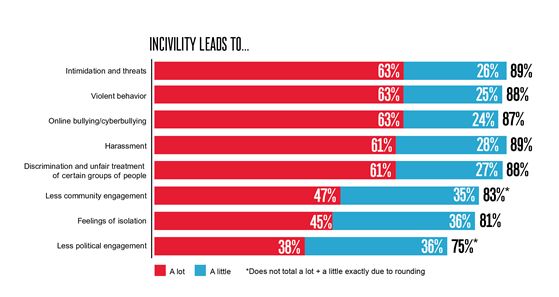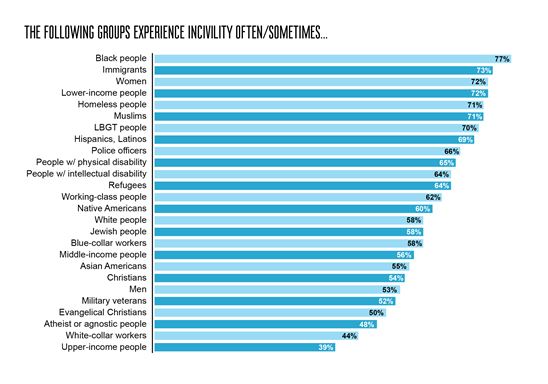In an Increasingly Uncivil Society, the Workplace is Becoming a Sanctuary for Many Americans
NEW YORK – May 15, 2017 – With uncivil behavior on the rise, Americans are finding that the one place most likely to provide refuge from society’s increasingly pervasive and offensive behavior and language is the workplace.

– Nearly Nine in 10 Employed Americans Say Their Workplace is Civil –
According to the seventh annual Civility in America poll conducted by Weber Shandwick and Powell Tate with KRC Research, 69 percent of Americans identify a “major” civility problem, a record high since the inception of the poll in 2010. An even greater number of Americans — 75 percent — say that incivility in America has risen to crisis levels, a significant increase from 70 percent in January 2016. The most recent survey was conducted in December 2016.
However, nearly nine in 10 employed Americans (86 percent) say that their place of employment is civil. Further, nearly two-thirds (63 percent) agree that people are more civil at work than outside of work. Whether there is a financial motivation to act civilly on the job (uncivil behavior could derail a promotion or lead to termination), or because workers know collaboration gets the work done, it seems that the workplace has the potential to be largely an incivility-free zone or refuge from the harsh incivility that has taken root in our public squares.
This is a remarkable finding given how pervasive incivility is in our society. For the past seven years, the Civility in America survey has tracked a perception among Americans that there is a severe civility deficit in our nation. When asked to write in what incivility means to them, respondents most typically refer to it as “rudeness,” “uncivilized” and “anti-social.”
When incivility does exist in the workplace, the costs to the employer can be significant. Although most employed Americans report they are currently working in civil environments, those who are not report that incivility has negative consequences on the job or at home. Mostly, it hurts employees’ on-the-job morale (55 percent), but there are numerous side effects that have direct financial implications for companies. These include turnover (45 percent), non-collaboration (40 percent), reduced product/service quality (36 percent) and fewer recommendations as a good place to work (33 percent). Nearly one-quarter (23 percent) call in sick because of the work incivility they experience. Incivility in the workplace is costly, but there is a personal price to pay, as 32 percent say incivility at work has negative consequences on their personal lives.
Harmful Effects of Incivility
Incivility leads to extreme outcomes in society at large and has serious consequences on an individual basis. The worst repercussions noted by most Americans are intimidation and harassment (89 percent each) and violence and discrimination (88 percent each). Cyberbullying is also a consequence recognized by the vast majority (87 percent), as is less community and political engagement (83 percent and 75 percent, respectively) and feelings of isolation (81 percent).

No Immunity from Incivility
Incivility is a common affliction among Americans. The vast majority – 84 percent – report having personally experienced incivility, most commonly occurring on the road (56 percent) or while shopping (47 percent). On average, Americans report that they encounter incivility nearly once a day: 3.4 times per week in real life/offline and 3.3 times per week online.
Americans from all walks of life experience incivility. When asked who is the most likely group to experience incivility, Americans put black people (77 percent) at the top of their list, followed by immigrants (73 percent), lower-income people (72 percent), women (72 percent), Muslims (71 percent) and homeless people (71 percent). Upper-income people are perceived to be the most shielded, but not entirely excluded, from incivility (39 percent). Incivility quickly adds up, considering that all Americans fall into multiple demographic segments.

Variety of Sources to Blame for Incivility
A majority of Americans (56 percent) expect civility to further erode. Those who predict a more uncivil future hold several parties responsible, but blame is focused primarily on politicians (75 percent), the Internet/social media (69 percent) and the news media (59 percent). Blame on the Internet and social media has increased over the years: Prior to January 2016, the rate of Americans blaming the Internet/social media had not reached 60 percent. Americans are least likely to blame Corporate America (31 percent), police/law enforcement officials (30 percent) and college students (22 percent).
Promoting Civility
There is an appetite among Americans to see some action taken to improve civility in America. They are most likely to choose a solution that puts the onus on social media sites and search engines to curb today’s rampant onslaught of fake news (58 percent), although other solutions are also of interest to at least one-third of people: civility training in schools (49 percent), employees reporting incivility at work to employers (40 percent), making employers responsible for eliminating incivility at work (38 percent) and a national campaign to promote civility (36 percent).
Please click here for the full Civility in America VII: The State of Civility report and infographic.
About the Research
Annually since 2010, Weber Shandwick and Powell Tate, in partnership with KRC Research, have released Civility in America: A Nationwide Survey. KRC Research conducted this seventh wave of the Civility in America survey online from December 9 to 16, 2016, among a sample of 1,126 U.S. adults 18 years and older, drawn from a national consumer panel. The survey was conducted in both English and Spanish, as determined by the respondent. KRC established demographic quotas and weighted data based on U.S. Census data (age, gender, education, income, race/ethnicity, region) as well as who respondents voted for in the 2016 Presidential election.
About Weber Shandwick
Weber Shandwick is a leading global communications and engagement firm in 79 cities across 34 countries, with a network extending to 127 cities in 81 countries. The firm’s diverse team of strategists, analysts, producers, designers, developers and campaign activators has won the most prestigious awards in the world for innovative, creative approaches and impactful work. Weber Shandwick was the only public relations agency included on the Ad Age Agency A-list in 2014 and 2015 and the only PR firm designated an A-List Agency Standout in 2017. Weber Shandwick was honored as PRWeek’s Global Agency of the Year in 2015 and 2016, The Holmes Report’s Global Agency of the Year in 2010, 2012, 2014 and 2015 and The Holmes Report’s Global Digital Agency of the Year in 2016. The firm deploys deep expertise across sectors and specialty areas, including consumer marketing, corporate reputation, healthcare, technology, public affairs, financial services, corporate social responsibility, financial communications and crisis management, using proprietary social, digital and analytics methodologies. Weber Shandwick is part of the Interpublic Group (NYSE: IPG). For more information, visit https://www.webershandwick.com/.
About Powell Tate
Founded by two of Washington, D.C.’s most respected press secretaries – Democrat Jody Powell and Republican Sheila Tate – Powell Tate has been one of Washington, D.C.’s leading public affairs firms for more than two decades, maintaining its bipartisan heritage while developing cutting edge programs that communicate across the political aisle and multiple platforms. Recently cited as one of Washington, D.C.’s “Best Places to Work” by the Washington Post and Washington Business Journal, Powell Tate is a division of Weber Shandwick. For more information, visit www.powelltate.com.
About KRC Research
KRC Research is a global full-service nonpartisan opinion research and strategy firm. A unit of the Interpublic Group of Companies (NYSE: IPG), KRC Research offers the quality and custom service of a small firm with the reach of a global organization. For over 30 years, KRC Research has worked on behalf of corporations, governments, not-for-profits and the communications firms that represent them. Staffed with multidisciplinary research professionals, KRC combines sophisticated research tools with real-world communications experience. For more information, visit www.krcresearch.com